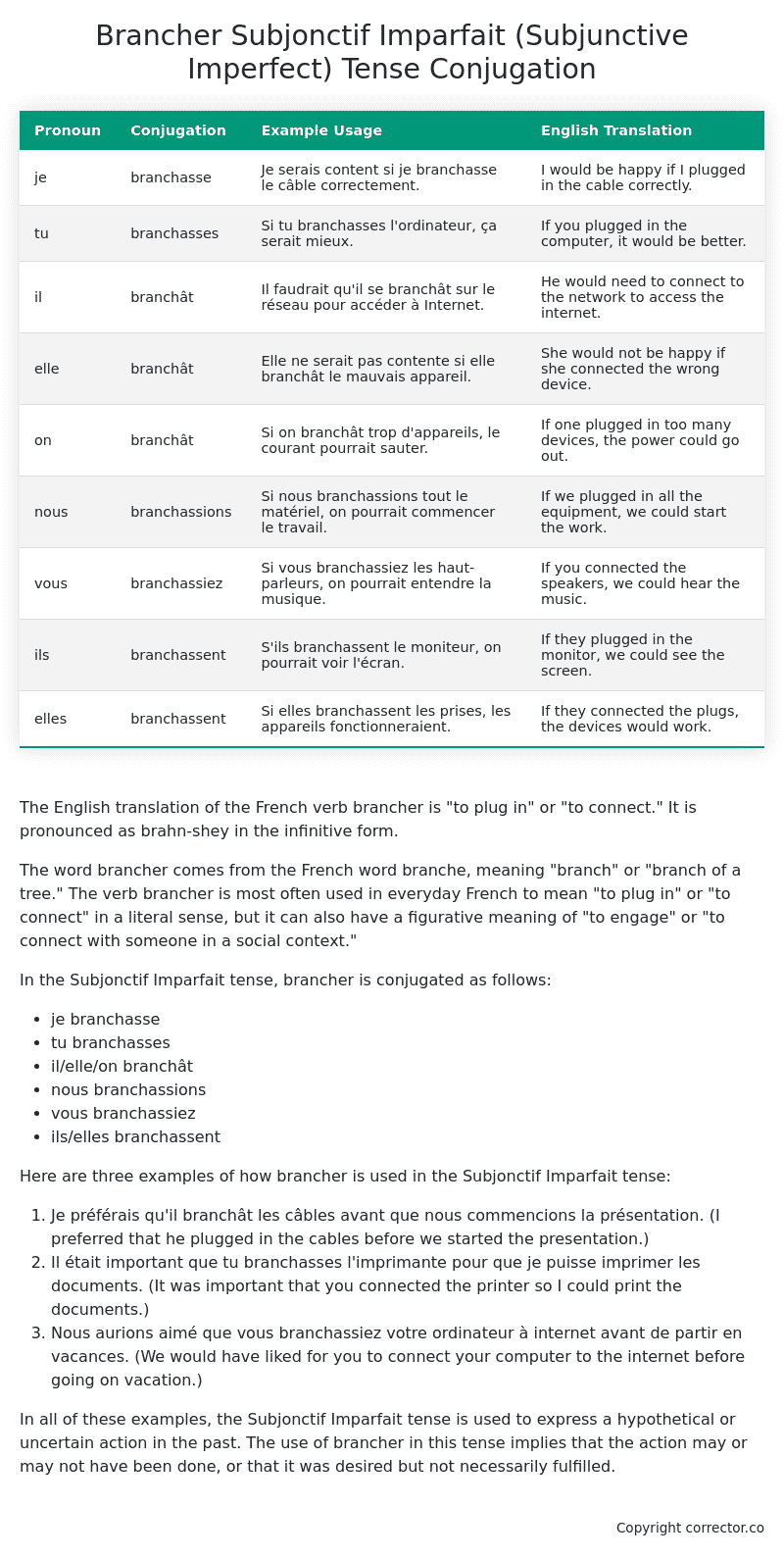Subjonctif Imparfait (Subjunctive Imperfect) Tense Conjugation of the French Verb brancher
Introduction to the verb brancher
The English translation of the French verb brancher is “to plug in” or “to connect.” It is pronounced as brahn-shey in the infinitive form.
The word brancher comes from the French word branche, meaning “branch” or “branch of a tree.” The verb brancher is most often used in everyday French to mean “to plug in” or “to connect” in a literal sense, but it can also have a figurative meaning of “to engage” or “to connect with someone in a social context.”
In the Subjonctif Imparfait tense, brancher is conjugated as follows:
- je branchasse
- tu branchasses
- il/elle/on branchât
- nous branchassions
- vous branchassiez
- ils/elles branchassent
Here are three examples of how brancher is used in the Subjonctif Imparfait tense:
- Je préférais qu’il branchât les câbles avant que nous commencions la présentation. (I preferred that he plugged in the cables before we started the presentation.)
- Il était important que tu branchasses l’imprimante pour que je puisse imprimer les documents. (It was important that you connected the printer so I could print the documents.)
- Nous aurions aimé que vous branchassiez votre ordinateur à internet avant de partir en vacances. (We would have liked for you to connect your computer to the internet before going on vacation.)
In all of these examples, the Subjonctif Imparfait tense is used to express a hypothetical or uncertain action in the past. The use of brancher in this tense implies that the action may or may not have been done, or that it was desired but not necessarily fulfilled.
Table of the Subjonctif Imparfait (Subjunctive Imperfect) Tense Conjugation of brancher
| Pronoun | Conjugation | Example Usage | English Translation |
|---|---|---|---|
| je | branchasse | Je serais content si je branchasse le câble correctement. | I would be happy if I plugged in the cable correctly. |
| tu | branchasses | Si tu branchasses l’ordinateur, ça serait mieux. | If you plugged in the computer, it would be better. |
| il | branchât | Il faudrait qu’il se branchât sur le réseau pour accéder à Internet. | He would need to connect to the network to access the internet. |
| elle | branchât | Elle ne serait pas contente si elle branchât le mauvais appareil. | She would not be happy if she connected the wrong device. |
| on | branchât | Si on branchât trop d’appareils, le courant pourrait sauter. | If one plugged in too many devices, the power could go out. |
| nous | branchassions | Si nous branchassions tout le matériel, on pourrait commencer le travail. | If we plugged in all the equipment, we could start the work. |
| vous | branchassiez | Si vous branchassiez les haut-parleurs, on pourrait entendre la musique. | If you connected the speakers, we could hear the music. |
| ils | branchassent | S’ils branchassent le moniteur, on pourrait voir l’écran. | If they plugged in the monitor, we could see the screen. |
| elles | branchassent | Si elles branchassent les prises, les appareils fonctionneraient. | If they connected the plugs, the devices would work. |
Other Conjugations for Brancher.
Le Present (Present Tense) Conjugation of the French Verb brancher
Imparfait (Imperfect) Tense Conjugation of the French Verb brancher
Passé Simple (Simple Past) Tense Conjugation of the French Verb brancher
Passé Composé (Present Perfect) Tense Conjugation of the French Verb brancher
Futur Simple (Simple Future) Tense Conjugation of the French Verb brancher
Futur Proche (Near Future) Tense Conjugation of the French Verb brancher
Plus-que-parfait (Pluperfect) Tense Conjugation of the French Verb brancher
Passé Antérieur (Past Anterior) Tense Conjugation of the French Verb brancher
Futur Antérieur (Future Anterior) Tense Conjugation of the French Verb brancher
Subjonctif Présent (Subjunctive Present) Tense Conjugation of the French Verb brancher
Subjonctif Passé (Subjunctive Past) Tense Conjugation of the French Verb brancher
Subjonctif Imparfait (Subjunctive Imperfect) Tense Conjugation of the French Verb brancher (this article)
Subjonctif Plus-que-parfait (Subjunctive Pluperfect) Tense Conjugation of the French Verb brancher
Conditionnel Présent (Conditional Present) Tense Conjugation of the French Verb brancher
Conditionnel Passé (Conditional Past) Tense Conjugation of the French Verb brancher
L’impératif Présent (Imperative Present) Tense Conjugation of the French Verb brancher
L’infinitif Présent (Infinitive Present) Tense Conjugation of the French Verb brancher
Struggling with French verbs or the language in general? Why not use our free French Grammar Checker – no registration required!
Get a FREE Download Study Sheet of this Conjugation 🔥
Simply right click the image below, click “save image” and get your free reference for the brancher Subjonctif Imparfait tense conjugation!

Brancher – About the French Subjonctif Imparfait (Subjunctive Imperfect) Tense
Formation
Common Everyday Usage Patterns
Interactions with Other Tenses
Subjonctif Présent
Indicatif Passé Composé
Conditional
Conditional Perfect
Summary
I hope you enjoyed this article on the verb brancher. Still in a learning mood? Check out another TOTALLY random French verb conjugation!


